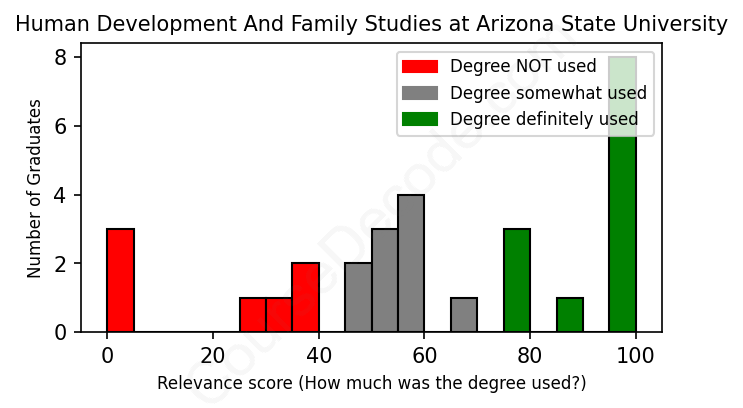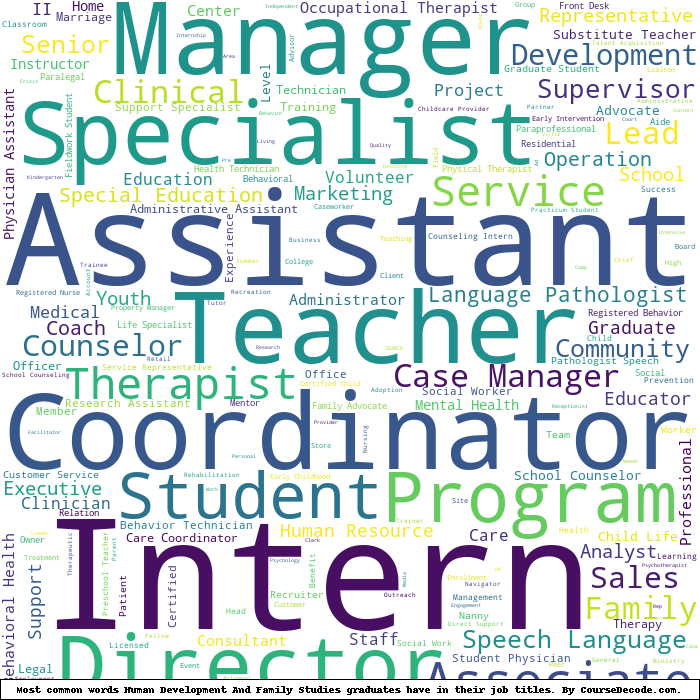
First, some facts. Of the Human Development And Family Studies graduates from Arizona State University we've analyzed , here's how many have used (or NOT used) their degree in their career:

These are estimates based on AI analysis of 29 LinkedIn profiles (see below).
The verdict? Below average. Overall, with an average relevance score of 61%, Human Development And Family Studies graduates from Arizona State University have a lower likelihood (-6%) of finding work in this field compared to the average graduate across all fields:
And for comparison, here's the chart for all profiles we've looked at across all degrees.
Also, after graduating, 44% of these graduates have pursued further education other than another Bachelor's degree (such as a Masters degree or other), compared to the average across all profiles of 35%. This suggests you may need more than just a Bachelors degree to be competitive as a Human Development And Family Studies graduate.
See the details:
|
Relevance score: 100% We think this person has gone into a career highly relevant to their degree. We think this person has gone into a career highly relevant to their degree.
DEGREE INFOGraduated in 2014 from Arizona State University with a Bachelor of Science (BS) in Human Development And Family Studies. Also pursued further education since (see below). JOB HISTORY SINCE GRADUATIONStudent Intern Child Development Lab Practicum May 2014 - Jul 2014 Research Assistant  Peers Everyday Emotions and Relationships at School Project Jan 2014 - Aug 2014 Family Support Specialist  Southwest Human Development Jan 2017 - Aug 2017 Caseworker  City of Phoenix Aug 2017 - Present Service Coordinator  Sunshine Therapy Services Jul 2018 - Present FURTHER DEGREES DONE SINCE GRADUATINGMaster's degreeArizona State University 2015 - 2017 ABOUTMy name is [NAME REMOVED] Torres, I graduated from Arizona State University in Fall 2014 with a Bachelor of Science in Family and Human Development. In spring 2017 I received my Masters Degree in Family and Human Development with a specialization in Child life. I am interested in pursing an occupation in pediatric psychosocial care. I have experience working with children from infancy to adolescence and with primary care givers. |
The top 10 most common jobs done by the graduates we've analyzed (ranked most common to least) are:
From analyzing the LinkedIn profiles of graduates from Arizona State University who studied Human Development and Family Studies, it looks like many of them have landed jobs in education, social services, and healthcare. Common roles include school counselors, teachers, social workers, and various positions in family support services. These jobs often require a good understanding of human development, family dynamics, and effective communication skills.
As for how relevant these roles are to their degree, there seems to be a mixed bag. While some positions, particularly in teaching, counseling, and social work, directly apply the principles and knowledge learned in Human Development and Family Studies, many others, especially in the healthcare field, may only utilize a fraction of that expertise. In those cases, the core functions of the jobs lean more towards clinical responsibilities rather than the supportive and developmental aspects emphasized in their studies. So, while there's a strong representation of relevant roles, a good few graduates have ventured into areas that don’t fully leverage the specialized knowledge from their degree.
Here is a visual representation of the most common words in job titles for Human Development And Family Studies graduates (this is across all Human Development And Family Studies graduates we've analyzed, not just those who went to Arizona State University):

Graduates from the Human Development and Family Studies program at Arizona State University seem to have a diverse range of career paths, often staying relevant to their degree. Many of them begin their journeys in supportive roles related to education, social services, or healthcare right after graduation. For example, roles like social worker, school counselor, and early intervention specialist are common first jobs. These initial positions appear to leverage their studies in human development by placing them in environments where they can actively support individuals and families in need. So right out of college, it looks like many graduates are finding jobs that resonate with their field of study, which is a solid start.
As these graduates progress five to ten years down the line, a significant number have continued to develop their careers within fields that align closely with human development or health services. Many take on roles with greater responsibilities, such as clinical therapists, program coordinators, and specialized educators. Newer roles like crisis coordinators and behavioral therapists have also emerged in recent years, reflecting changing societal needs. However, there’s also a noticeable trend of some individuals moving away from direct human services to positions in general management or unrelated fields like customer service and retail. So while a good chunk of ASU graduates is still making their mark in meaningful careers, others have drifted into jobs that may not utilize the full potential of their degree. Overall, it's a mixed bag of success stories and some lesser-aligned paths, but many still seem to find their way back to work that ultimately supports human development themes.
Honestly, a Bachelor’s degree in Human Development and Family Studies at Arizona State University is pretty manageable compared to some other majors. It often focuses on topics like psychology, sociology, and family dynamics, which can be really interesting and relatable, so if you enjoy learning about people and relationships, it might feel a bit easier for you. The workload typically includes a mix of lectures, discussions, and some projects, so you won’t be buried under tons of hardcore science or math. While it definitely requires some studying and commitment, most students find it to be an enjoyable and not overly stressful journey. So, if you’re passionate about understanding human behavior and family structures, you’ll probably find it to be a good fit!
Most commonly, in the LinkedIn profiles we've looked at, it takes people 4 years to finish a Bachelor degree in Human Development And Family Studies.
Looking at the job history of these Arizona State University grads, it seems like they’re kind of in mixed territory when it comes to making decent money. Some of them are in solid roles, especially in healthcare and education, which typically pay pretty well, like the Physician Assistant and School Counselor positions. Others have taken roles in social services and administrative positions that don’t usually come with great pay, especially early on, like working as a substitute teacher or various coordinator roles that can be lower on the pay scale. Even newer grads are jumping into jobs like sales or coordinating assistant roles, which can be hit or miss in terms of salary. Overall, it looks like some are doing well while others might be struggling to find that financial sweet spot right after graduation.
Here is a visual representation of the most common words seen in the "about" section of LinkedIn profiles who have a Bachelor degree in Human Development And Family Studies (this is across all Human Development And Family Studies graduates we've analyzed, not just those who went to Arizona State University). This may or may not be useful:

Here are all colleges offering a Bachelor degree in Human Development And Family Studies (ordered by the average relevance score of their Human Development And Family Studies graduates, best to worst) where we have analyzed at least 10 of their graduates:
| College | Score | Count |
|---|---|---|
 Oklahoma State University Oklahoma State University
|
91 | 10 |
 University of Wisconsin-Madison University of Wisconsin-Madison
|
84 | 15 |
 University of Wisconsin-Stout University of Wisconsin-Stout
|
83 | 22 |
 The University of Texas at Austin The University of Texas at Austin
|
81 | 14 |
 Virginia Tech Virginia Tech
|
80 | 12 |
 The Ohio State University The Ohio State University
|
77 | 12 |
 Penn State University Penn State University
|
76 | 34 |
 University of California, Davis University of California, Davis
|
76 | 18 |
 Kansas State University Kansas State University
|
75 | 17 |
 University of North Texas University of North Texas
|
74 | 12 |
 University of Illinois at Urbana-Champaign University of Illinois at Urbana-Champaign
|
74 | 12 |
 Brigham Young University Brigham Young University
|
73 | 28 |
 University of Connecticut University of Connecticut
|
72 | 22 |
 Michigan State University Michigan State University
|
71 | 18 |
 Texas Tech University Texas Tech University
|
70 | 26 |
 Colorado State University Colorado State University
|
69 | 41 |
 Bowling Green State University Bowling Green State University
|
69 | 18 |
 University of Rhode Island University of Rhode Island
|
69 | 14 |
 Oregon State University Oregon State University
|
68 | 28 |
 Washington State University Washington State University
|
67 | 16 |
 University of Arizona University of Arizona
|
62 | 13 |
 The University of Alabama The University of Alabama
|
62 | 10 |
 Arizona State University Arizona State University
|
61 | 29 |
 The University of Georgia The University of Georgia
|
61 | 17 |
 University of North Carolina at Greensboro University of North Carolina at Greensboro
|
58 | 14 |
 California State University San Marcos California State University San Marcos
|
49 | 12 |